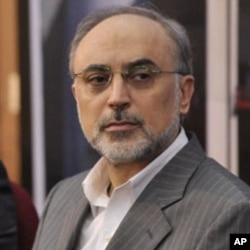Iran's foreign ministry spokesman Ramin Mehmanparast told journalists Tuesday that the firing of Foreign Minister Manouchehr Mottaki Monday will not affect the country's foreign policy, or positions over its nuclear program.
The sacking of Foreign Minister Mottaqi Monday was the source of more questions than answers Tuesday as journalists eagerly quizzed spokesman Ramin Mehmanparast.
Mehmanparast's stated there would be no change to Iran's foreign policy, but shed little light on what happened or what the future might bring.
He insists that on a practical basis changes in civil servants or their responsibilities are a normal feature in the workings of Iran's Islamic Republic. He added that key policies have a fixed framework and principles, and that the replacement of a minister will not change those policies.
The foreign ministry spokesman went on to praise outgoing foreign minister Mottaki and laud his just-named successor, nuclear energy chief Ali Akbar Salehi.
He says that Mottaki's almost five year stint as foreign minister was marked by great activity and great achievements and that the minister worked diligently to achieve Iran's foreign policy goals. He adds that Salehi is a thinker and a religious man, worthy of respect, and that Iran will be secure as he handles the country's foreign policy, diplomacy, and national interests.
Several conservative newspapers criticized the firing of Mottaki, and the outspoken editor of the hardline Kayhan daily called it an "open insult." The former foreign minister was on a trip to Africa when the announcement was made that President Mahmoud Ahmadinejad had replaced him.
Former Iranian President Abolhassan Bani Sadr calls the firing "scandalous," but points out that Mr. Ahmadinejad is trying to tell the world that he along with Supreme Leader Ali Khamenei are "in charge" of Iran's foreign policy.
He says that President Ahmadinejad went about replacing his minister in a scandalous way, since he was on a visit abroad, and even the hardliners in Iran are criticizing how he went about it. He insists that this shows that Mr. Ahmadinejad was in disagreement with his minister and that firing him was his way of telling everyone both inside and outside Iran who is in charge.
Mr. Bani Sadr stresses, however, that Supreme Leader Ali Khamenei must no doubt have seconded the decision to fire Mottaki or Mr. Ahmadinejad could not have done it. He also argues that the decision to name Ali Akbar Salehi to replace him could be a signal to the West that he and Khamenei will be the ultimate arbiteurs during nuclear negotiations in January.
Salehi, who holds a doctorate from the prestigious Massachusetts Institute of Technology, is arguably Iran's top nuclear expert. Iran analyst Gary Sick of Columbia University thinks that the choice of Salehi may reveal Iran's desire to put the nuclear issue at the core of its foreign policy.
"Salehi is one of the real experts in Iran on nuclear issues," he said. "He has been part of that forever, and really knows it top to bottom and all the details. So, if the nuclear issue becomes the center piece of Iranian foreign policy, which it might be, he is probably better positioned than almost anybody else to deal with that."
Sick notes that the choice of Salehi, who is both affable and well-versed in English, may or may not be a boon to negotiations with the U.S. and the West.
"He's known to a lot of Americans," said the analyst. "Even I have sat down with him at various times when he was in Vienna. His English is really perfect and he's an approachable person. That may or may not be important. We've had people before, who were at the U.N. and elsewhere, Iranian foreign policy people, who were all of those things, approachable, excellent English, educational background in the United States etc. and in most cases it hasn't made a difference."
Salehi also attended the American University of Beirut and speaks almost perfect Arabic. Iran's relations with most Arab and Gulf States have been severely strained in recent years, as the recent Wikileaks revelations point out, so the choice of Salehi may also be meant to repair bridges with the East, as well as the West.














